|
I lead the Catholic Volunteer Network (CVN) – but am not Catholic. My journey to this unique place has not been overnight or accidental. It comes from years of commitment to unity.
CVN is the leading faith-based service organization fostering full-time, faith-based lay mission service. Our membership consists of 155 Christian volunteer programs serving throughout the U.S. and in over 100 countries. In any given year, up to twenty percent of our programs may be identified as Protestant. In addition, volunteers who serve in CVN programs range from cradle-Catholics to spiritual seekers. Recently, the CVN Board of Directors affirmed the importance of witnessing to our identity as Catholic and ecumenical. This approach works because, to a great degree, both CVN programs and volunteers respect each other’s identities and goals. As they learn about each other via extensive application processes, a relationship of understanding and trust begins. The result is clarity about needs and expectations, and in many cases a willingness to engage with “the other” for a significant amount of time. When a year-long volunteer community is ecumenical, learning that enhances and transcends that experience can transpire. CVN thinks that is good—that faith and mission throughout life in a complicated world requires an openness to understand other approaches to faith, community, and service. Openness to different experiences put me on a path of fostering Christian unity. Therefore, when a role with CVN became a possibility, I was drawn to it not despite it being Catholic – but because it is Catholic. I wanted to be part of a network discerning how a commitment to Jesus Christ unites us and enhances witness to his Gospel in the world. But I did not get to that place without a mixture of providence and intention. Years ago, I was the Director of Public Policy for Call to Renewal (CTR), a diverse network of national churches and faith-based organizations united to overcome poverty. CTR’s vision was that Christians from across the theological spectrum working together could inspire other Christians to foster relationships across denominational affiliations, as well as inspire political leaders to work together across the aisle. It was an attempt to break down the divides created by labels such as liberal and conservative, and to honor a range of anti-poverty strategies often considered to be at odds with each other (e.g. strengthening families and supporting government programs). Members of CTR included Protestants, Evangelicals, Catholics, Peace Churches, and more. National leaders from these churches agreed that progress could be made to reduce domestic poverty if they chose not to allow theological and doctrinal differences on other matters to prevent collaboration. Because of this, many Christian leaders met counterparts for the first time and nurtured relationships grounded in openness and a willingness to learn. Many found a new respect for different approaches to faith, as well as different views on how to reduce poverty. That experience and others broadened my theological and political perspectives. Since then, I have sought to build relationships and bridges. I still have convictions and disagree with others, but am less likely to judge quickly or to shut doors. I am more likely to be curious about how God wants me and others to engage despite differences. Sometimes unity means affirming a shared connection to Christ, getting to know another, and seeing where that leads. Sometimes it is a strategic partnership to pursue change. I just try to witness to what I believe – and pray God can act through me and others. I pray that you, too, find special ways of witnessing to the strength of Christian unity. I pray that openness and experience will transform you. The world needs our example. To learn more about Christian unity, please click here. To learn more about faith-based service opportunities with the Catholic Volunteer Network, please click here.
0 Comments
O God, Thou art my God, I seek Thee, my soul thirsts for Thee; my flesh faints for Thee, as in a dry and weary land where no water is. -Psalm 63:1 There are seasons in the spiritual life in which you feel parched, as if you’re wandering the desert without refreshment. Silent reflection is filled with distraction. Prayer seems awkward, difficult, or boring. Your heart feels lifeless. Lately, despite my attempts to find escape, this sums up my prayer experience. It doesn’t matter that I infuse my days with the Mass readings, a Rosary, Catholic podcasts, or spiritual books. Right now, it seems so much easier to turn on a show or scroll through social media than to pray. Any time I resolve to do the latter, all the things I need to do bombard my mind, or the texts and notifications come in streaming. At Mass, I hear the beautiful words of Scripture and the homily but feel hollow in the pew. Am I a bad Catholic? Is something wrong? During times like these, many people of faith get disheartened. They think they have done something wrong in the spiritual life, that God has abandoned them, or that their faith must not be relevant anymore. But all people of faith will experience this to some degree at one point or another! It is often hard to trudge through when warm feelings are absent and prayer requires intentionality and effort, but these times in the spiritual life can be the most fruitful of all. Our hearts can grow cold and tepid for two reasons: either we’ve slackened in the spiritual life and slowly let the cares of the world take over – like the weeds that choke out the good seed in the parable – or God is calling us to deeper faith and growth. If it’s the latter, this is often a time of spiritual maturation that deepens our faith and love. We choose to cry out to God in prayer not because it makes us feel good or holy or satisfied, but because we trust in God and love him despite how we might feel. We’ve often heard that love is a choice, not a feeling. Therefore, when feelings are absent, God is inviting us to choose him with a love that is selfless and trusting. The feelings that are lukewarm, indifferent, or distracted are part of the spiritual dryness St. Ignatius of Loyola called “desolation.” According to St. Ignatius, there are moments in the spiritual life of both consolation and desolation. In times of consolation, we feel especially close to God, find prayer easy, fulfilling, and natural, and have peace and joy. I remember one time talking to a priest in spiritual direction who asked how things were going spiritually. I told him I almost felt guilty because all was going smoothly. He chuckled and told me to enjoy this time of consolation because it wouldn’t last forever—advising me to write down my feelings and spiritual observations as something to look back on in times of dryness or sorrow. A quote attributed to St. Philip Neri sums up this ebb and flow: “As a rule, people who aim at a spiritual life begin with the sweet and afterward pass on to the bitter. So now, away with all tepidity, off with that mask of yours, carry your cross, don’t leave it to carry you.” How can you carry your cross during this time? Below are some tips to reinvigorate your faith and get you through this time of spiritual dryness.
It is important if you feel indifferent to your faith right now not to give up. I encourage you to re-double your efforts in prayer, seek help from your community and the saints, and persevere. Know that this is a completely normal phase of the spiritual life, that even the saints felt arid at times, and that you are not alone. As a communications manager who handles the social media accounts for my day job, I’ve had to work at and learn how to better manage my time spent on social media. While this technology is an exciting and ever-evolving resource for sharing and obtaining news, I’ve found social media can also drain my energy or keep me from my priorities. Within the last year, I noticed I was spending four or more hours a day on social media and browsing the Internet. I saw my spiritual life was being affected, so during this past Lent, I decided to do something about that imbalance. I knew I still needed social media for work use, and I discovered a solution. By implementing the screen time and do-not-disturb settings on my phone, I found I could limit my social media consumption to an hour per day. Whatever time was left after work allocations I could spend on personal social media time. Most days I used 45 minutes or the whole hour for work. I came to appreciate that my time was spent elsewhere in a more productive manner. I used the time for additional prayer, reading, church, conversations with friends, and other enjoyable activities. My brain didn’t feel as fuzzy and scattered with random bits of information that would send me off the paths toward my personal, professional, and spiritual goals. After Lent, I took off the screen time and do-not-disturb parameters on my phone due to an evening work event. Since then, I’ve turned them back on. This experience of self-reflection and adjustment of my behaviors reminded me of why God provides us with commandments: to set us free from sin in order to allow us to become more perfectly the people he created us to be. By growing in self-awareness and setting self-imposed boundaries, we can better harness social media for the good. Here are a few questions to consider that I have found help me when evaluating my time spent on social media: (1)Are you present to those around you? People using their digital devices when in the company of others is a growing trend – and a sad one at that. Instead, we should put away our devices and give our attention and time to those in front of us. Being fully present to those we are spending time with in-person shows that we are investing in our relationships and affirming their humanity. By being present to those around us, we respect them and uphold their dignity. (2)Do you let social media distract you from God and others in your life? Have you formed the habit of checking your phone every couple of minutes or felt the non-existent buzz of a notification? Have you moved to autopilot looking through your social media feeds or gone down the rabbit hole of an internet or video search only to see that one, three, or more hours have gone by? This reliance on our phones provides great distraction in our lives, making us susceptible to temptation. We should work to embrace silence with ourselves and with God. By scheduling solitude with God in prayer or time for ourselves to be constructive, we come to know God’s path for us and how he calls us to give of ourselves to others in love. (3)Ask yourself, “Do you really need to share this moment?” With 24/7 access to an inside look at our life’s daily moments through social media, we seem to have lost a sense of privacy and humility. Before posting content to social media, consider the discretion of the moment. Check with family, friends, and significant others if something including them is appropriate to post. Respect their space and yours. Ask yourself why you’re posting the content you want to share and check your motivations. (4)Do you view social media as an outlet that steals your happiness or as a way to share your joy? There is much truth to the adage, “Comparison is the thief of joy.” Comparing ourselves, our possessions, our appearance, our jobs, our wealth, and our relationships to those of others prohibits us from feeling gratitude for our blessings and can derail us from our personal goals. Thanking God for at least one thing a day can help cultivate a spirit of joyfulness, allowing us to celebrate, learn from, and be happy for others around us. (5)Do you feel isolated when spending time on social media? Social media can be a great way to connect with Catholic communities. Personally, I enjoy the discussions and fellowship that Facebook groups cultivate. However, we must be cautious of the temptations to become a technology hermit, as Pope Francis warns of in his 2019 World Day of Social Communications message, or posting “for the sake of Instagram” or self-interested comments. (6)How do you treat others on social media? What we say on social media and Internet comment sections matters. Pope Francis encourages Catholics to live out the faith through social networks as the Body of Christ, welcoming others. As the United States Council of Catholic Bishops’ social media guidelines, we as the Church “can use social media to encourage, respect, dialogue, and [cultivate] honest relationships – in other words, ‘true friendship.’” By living out our faith through the example we set in loving others on social media through our posts and comments, we reveal Christ. World Youth Day (WYD) is so much more than an international get-together with the pope. Too often, global experiences of faith get overlooked or underestimated; other times, since these gatherings have taken place now for four decades, they are simply taken for granted within the Church. But such oversight would be a missed opportunity for everyone in the Church and around the world. Why should we care? Three simple words: World. Youth. Day. Let me explain: World The first reason is that WYD is truly meant for the whole world. While young adults heading to Krakow in July are the primary protagonists of this particular international gathering, the message of WYD applies to everyone – everywhere. In fact, thanks in part to the growing accessibility of technology and social media, this pilgrimage is not limited to those who have the means to travel overseas. There are millions of young adult Catholics in the United States who can engage in WYD – through local stateside events in their parish, campus, or diocese, as well as through social media and digital communications. The U.S. bishops and pilgrim leaders in Krakow will be engaging directly with stateside and digital pilgrims this year so that those at home in the United States are as much a part of the pilgrimage as those who boarded a plane bound for Poland. No one is excluded – and that message is exactly what WYD offers the rest of the world. One of the frustrations many people experience during these international displays of faith is feeling left out, or feeling like they don’t matter. WYD is a chance for pilgrims to share in real time on social media a message of mercy and love that’s available to all. This message is meant not just for Catholics, Christians, or Krakow pilgrims; it is meant for the world. Youth There are many times when I get asked about “the kids” at WYD, and often, this feels like a dismissal – that this global experience is somehow just a “giant youth rally” not needing to be taken seriously. Such thinking is exactly why Pope St. John Paul II established the practice of WYDs: to remind the world that a gathering of young people is essential to the vibrancy of the Church and the transformation of the entire planet. Even more, there is a significant misconception about WHO this gathering is intended for. The name alone can be misleading. The “youth” in the WYD title is actually mistranslated in English. The target audiences for these international pilgrimages are “young adults.” That is, those in their late teens, twenties, and into their thirties. In 2016, the majority of U.S. pilgrims range from ages 18 to 30, and most diocesan groups are taking young men and women in their 20s and 30s, single and married. In other words, they aren’t “kids.” This news is actually incredibly refreshing, considering that young adults are one of the most disconnected groups of people from the Catholic Church and the practice of the faith. Around the United States, studies show that only 17% of millennial Catholics attend church weekly, and over one-third of young millennials have no religious affiliation whatsoever. To know that thousands of young adults from the U.S. are going to Krakow, and even more are engaging stateside or digitally, is one of the most important things that Catholics can celebrate this month. Let’s work to create local communities open to their enthusiasm so that returning pilgrims can engage in the life of the Church. Day It can be easy to dismiss WYD as a “Catholic Woodstock” – a one-time festival over the course of a few days when the pope and millions of young people gather together in a large open field to pray and talk about God. But again, there is so much more. WYD is not a “day” at all – but a pilgrimage. It includes months or years of spiritual and practical preparation, leading into years of follow-up work: putting into practice the message of WYD and the lessons learned along the way. One could compare this experience to a mountaintop journey. The events in Krakow or stateside are just the peak. And mountains are more than their highest summits. Too often, especially in the twenty-first century, we jump from one major task to the next, hardly stopping to slow down. Sometimes WYD is reduced to another task or event in a long line of trips, events, or papal visits. Many WYD pilgrims know that the journey is so much more than that. For some, WYD inspired them to their life’s calling: to marriage, to religious life or to the priesthood, to their careers, or to simply being an active adult Catholic. WYD is a catalyst for great things yet to come. This is just one reason why I encourage people to pay attention to WYD and what might emerge from the pilgrims who return home, and who will rise to the occasion. In a world torn apart by violence, polarization, and fear, let us heed the value of a lifelong pilgrimage: a process of accompaniment that requires time, patience, compassionate listening, and understanding – things often lacking in our world today. It can be tempting to excuse ourselves from caring about or thinking about WYD, dismissing it for one reason or another. Yet this is a moment of grace for everyone – from the pilgrims to the rest of the world. For one week, the Church turns its attention to this special encounter. Let’s not let this moment pass us by or excuse ourselves from paying attention. The world, especially in uncertain times and the face of tragedy and unrest, is in need of the graces that can come from WYD. It is meant for the world. It can be a mountaintop of the Catholic young adult experience. Let us pray that the end results can help heal, transform, and bring mercy and compassion into a world torn apart and hurting. To learn more about World Youth Day, please click here. *This post was originally published for our World Youth Day series on July 20, 2016
For the past few weeks, bishops from across the globe have met in Rome for the XV Ordinary Assembly of the Synod of Bishops to discuss Young People, the Faith, and Vocational Discernment. This is a momentous time for the Church, one in which she has paused from her work in order to listen and dialogue with a powerful age group in our world today: young people. In imitation of Christ Himself, who sat down during His ministry and said, “let the children come to me,” the successors of the Apostles are engaging the young people of the world in order to learn from them, engage with them, and better accompany them on their faith journey. But what does this mean for the rest of the Church? What does this mean for us personally? The Synod is not just an event occurring in Rome, nor a series of documents and pastoral initiatives. Below I have compiled 5 key take-aways from the Synod that we can apply to our own spiritual lives. 1. Invite the Holy Spirit. In his homily for the opening of the Synod, Pope Francis reminded his brother bishops to call upon the Holy Spirit before embarking on their work. “It is the Spirit,” Pope Francis said, “who ensures that the richness and beauty of the Gospel will be a source of constant joy and freshness.” This is true for each of us. Christ left us with the gift of the Holy Spirit after His Ascension into Heaven; the Holy Spirit is our Advocate and remains with us today, present in our hearts as a result of our Baptism. Before embarking on our work on earth, let us call upon the Holy Spirit in order to guide us and ensure we are faithful to our mission. It was the Holy Spirit who transformed the cowering Apostles into bold missionaries, evangelists, and martyrs. The same Holy Spirit leads us today and helps us fulfill our baptismal call. Invite the Holy Spirit into your life, work, and day to day actions in order to live out the richness and beauty of the Gospel that Pope Francis mentions. 2. Listen. The Synod participants have been encouraged to listen intently to what the young people of the Church have to say. This attitude can only be successful if it stems from a posture of humility, an openness to the other, and a flexibility to adapt our perspective based on what we learn. All of us are called to listen to and accompany those we encounter in our day to day life. This is especially true for those of us working in ministry, but can be applied to whatever circumstance we find ourselves in. We live in a culture that seems afraid of listening. Listening is often associated with vulnerability. It opens our minds and hearts to the perspective, ideas, and dreams of the other—whether or not we agree or resonate with these personally. However, “love for the Gospel and for the people who have been entrusted to us, challenges us to broaden our horizons and not lose sight of the mission to which we are called,” Pope Francis said. Listening to another person challenges us to step outside of our comfort zone and acknowledge the truths of the other. Only by listening can we hope to dialogue respectfully with those who might not share our worldview or beliefs. 3. Discern and be silent. After calling upon the Holy Spirit, we need to create a space of silence where we can listen to God’s promptings. For the first time in a Synod, Pope Francis has instituted 3 minutes of periodic silence for participants to reflect on what’s been shared and on what God is stirring in their hearts. This is a wonderful example of ongoing discernment, which invites God into our life and asks Him to guide us in our everyday actions and decisions. “Discernment is the method and at the same time the goal we set ourselves,” Pope Francis said. “It is based on the conviction that God is at work in world history, in life’s events, in the people I meet and who speak to me.” We can also learn from the spirituality of The Society of Jesus, which emphasizes being “contemplatives in action.” This spirit of discernment is radically different from the world of busyness and noise we often find ourselves in, but it also is capable of existing within that world. When we periodically withdraw into the inner room of our hearts and pray to our heavenly Father in secret, we become better attuned not only to His presence in our hearts, but also to God’s presence in those around us. 4. Be flexible. Sometimes, it is easy to come up with preconceived notions of how things ought to be done or to maintain an attitude of “it’s always been this way.” Throughout his papacy, and once again at the beginning of this Synod, Pope Francis has challenged the Church to be flexible and to shatter our temptation to conform. In his homily for the opening of the Synod, he called the Church to “broaden our horizons, expand our hearts and transform those frames of mind that today paralyze, separate and alienate us from young people.” A healthy flexibility is key to our well-being in whatever vocation we find ourselves. Flexibility also relies on humility and allows us to admit that we don’t always have the right answers. When we as a Church are flexible, we are better able to encounter others and work together to seek the truth of the Gospel. 5. Dare to hope, to dream. A great gift that young people can give the Church is their ability to dream. Young people have passion, enthusiasm, hopes, and dreams that offer freshness and renewal to our Church and to the world. This is even more important in a world laden with suffering and problems, where it is easy to succumb to a defeatism or a pessimistic attitude. Pope Francis reminds us that “The future is not a threat to be feared, but is the time the Lord promises us when we will be able to experience communion with him, with our brothers and sisters, and with the whole of creation.” When our faith is rooted in the goodness and beauty of Christ Himself, we are better able to share His joy and hope with the world. Let us learn from the vigor and hope of young people today. May it be contagious, so that others are drawn to ask us for an account of our hope. As Pope Francis concluded in his Address at the Opening of the Synod of Bishops, “Let us therefore work to “spend time with the future … to plant dreams, draw forth prophecies and visions, allow hope to flourish, inspire trust, bind up wounds, weave together relationships, awaken a dawn of hope, learn from one another, and create a bright resourcefulness that will enlighten minds, warm hearts, give strength to our hands, and inspire in young people – all young people, with no one excluded – a vision of the future filled with the joy of the Gospel.” For more resources on the Synod on Young People, the Faith, and Vocational Discernment, please click here. Every family gathering, I look forward to catching up with my relatives over good food, interesting stories, and lively table talk. Inevitably in my family, the conversation transitions to religion. It’s a heated discussion given that my immediate family is Catholic, whereas the rest (on my mother’s side) is Coptic Orthodox. From then on, our respective faith traditions are more or less pitted against each other as theological matters are analyzed and debated. Of course recognizing that at the core we are Christians united to our Lord through our baptism, we continue to respect each other’s beliefs (cf. Galatians 3:27). We still pray and hope for unification, too, though there are disagreements among us as to how this might occur. In any case, these opportunities to evangelize are enjoyable, as each of us advocates for the faith that has shaped our lives and beings.
“The restoration of unity among all Christians is one of the principal concerns of the Second Vatican Council.” This first sentence of Unitatis Redintegratio, the Decree on Ecumenism is still surprising to many Catholics. It set the stage for the last fifty years of Catholic dialogue and conversation with our Orthodox, Protestant, and Anglican brothers and sisters in the Faith. The Decree gives “Catholic Principles on Ecumenism.” Even Jesus, at the Last Supper, prayed for unity, that His disciples be one (see John 17:21). Ultimately, Christian unity is God’s will and the work of the Holy Spirit rather than solely our own. The Decree nevertheless urges all Catholics to participate in the noble work of Christian unity (#4). This work— our conversation, dialogue, and service with others— calls for complete honesty. We must represent the position of others with truth and fairness and never be dismissive or ignorant of the other traditions. By not pointing fingers and recognizing that any blame for schisms in the Church is shared by all, a heartfelt and meaningful dialogue can be achieved. Ecumenical dialogue, rather than making us less Catholic, makes us more so. By searching within our own faith, we are made aware of the commonalities that we share with our fellow Christians. As for the divergences that we also discover in doing so, it is the Holy Spirit who will help us to overcome them; ecumenical conversation leads us back to prayer: “This change of heart and holiness of life, along with public and private prayer for the unity of Christians, should be regarded as the soul of the whole ecumenical movement, and merits the name ‘spiritual ecumenism’” (#8). To engage others, then, a spirit of humility, honesty, patience, and gentleness is needed. After all, the Church is stronger when its members are open to and inclusive of all traditions. How can the Church, being commissioned to spread the Truth to all, fully honor her call if she does not communicate well with fellow Christians (see Matthew 28:19-20, cf. 1 Corinthians 10-15)? Though we may not agree on every theological point, Christians of all traditions continue to work towards the unification and the strengthening of Christ’s body (see 1 Corinthians 12:12-27). We worship the same Lord, Jesus Christ, Who sacrificed Himself for all without distinction. We answer the same call to evangelize and offer ourselves in loving service to all. The holy sacrifice of the Mass offered and the reception of the sacraments by Christians each day are the same gifts and sources of grace from God. And the ultimate witness of martyrs for their belief in Christ across the world and time further lead us on the road to unity. The Church continues to face uncertain times, just as she always has; Christ, likewise, remains steadfast in His promise to stand by her (see Matthew 16:18, John 16:33). Thomas Wong is an undergraduate at The Catholic University of America in Washington, D.C. Today we celebrate the feast of St. Augustine, a Doctor of the Church and one of the most important theological writers of the 4th and 5th century. Many of us have either studied Augustine or at least heard some of his more famous quotes. One in particular is quite striking: “Our heart is restless until it rests in you.” These words are taken from one of Augustine’s most well known writings, the Confessions, in which Augustine discusses his long journey towards Christ and his conversion to Christianity.
“Our heart is restless until it rests in you.” These are powerful words. They direct us toward Christ in a simple way that speaks to everyone, for everyone has a restless heart. Pope Francis tells us that Augustine is speaking of three types of restlessness: “the restlessness of spiritual seeking, the restlessness of the encounter with God, the restlessness of love.” This restlessness, whether we recognize it or not, is a desire to know God and to have a deeper relationship with Him. None of this is easy, but God is always there for us. He is waiting with open arms, just as he waited for Augustine in his conversion to Christianity, so that we might rest in Him. Of course, the natural question to ask is how we can rest in the Lord. Augustine gives us a clear answer in his Confessions. He says: “No one knows what he himself is made of, except his own spirit within him, yet there is still some part of him which remains hidden even from his own spirit; but you, Lord, know everything about a human being because you have made him… Let me, then, confess what I know about myself, and confess too what I do not know, because what I know of myself I know only because you shed light on me, and what I do not know I shall remain ignorant about until my darkness becomes like bright noon before your face.” Augustine is giving us an important model of faith to follow, one of deep personal reflection, one that teaches us how to reflect and why we should reflect. Why? Because in reflection, we find God, in reflection, we find rest. But Augustine is very clear about how reflection works. He says, “What I know of myself I know only because you shed light on me.” Reflection is not solitary; we have to reflect with God. It is a prayer. We have all been told time and time again that prayer is an integral aspect of our everyday lives, but prayer does not have to be formulaic, it does not always have to be recited from the back of a card. These types of prayers are amazing and so helpful in directing our lives, but some of the most beautiful prayer is when we reflect with God, when we open up ourselves to Him and just talk to Him and listen to Him in our hearts. Who better to show us the importance of reflection than our Mother? Luke 2:19 tells us “And Mary kept all these things, reflecting on them in her heart.” Mary, the Mother of God, born without sin, who through her body brought Jesus into this world, still took the time to reflect with the Lord. Augustine and Mary are both powerful examples to us. They were holy people, but they were human. They faced struggles in their lives and in their faith. Their hearts were restless in their journeys toward the Lord. But through their example, through their lives, through personal reflection with the Lord, they show us how to find rest in Him. Nicholas Shields is a current District Deputy for the Washington, D.C. Knights of Columbus and a recent graduate of The Catholic University of America. "The joy of love, the answer to the drama of suffering and pain, the power of forgiveness in the face of an offence received and the victory of life over the emptiness of death" (Porta Fidei, 13)
Death is often something that we do not like to discuss, especially in the context of the New Evangelization. These two concepts might seem like they don’t mix well, but I hope to show how they are. It is quite natural that we try to deflect the topic of death and dying and why we do not want to face the reality of a difficult situation. But, when death comes into our lives we have no control and it is something that we must handle. After the wake and the funeral are over, and the family goes home, the void is sill there. The sense of loss does not want to go away and it seems like we cannot move on from the loss. On March 7th, I went though this pain for the fourth time this past year with the passing of my paternal grandfather and namesake. I lost two grandfathers, a cousin, and a close family friend who I consider more like an uncle. Each of these individuals have greatly impacted my life and I would not be who I am without them. Recently I have done a lot of reflecting on what these lives have meant to me. Time and time again I go back to the number of lessons that my grandfathers' have taught me. They taught me some of the classics like fishing, a love for music and art, gardening and the importance of a good cup of British Tea or Italian coffee. But it was not these lessons that are the most import that matter. These two men also taught me the importance of family, tradition, love, and faith. My maternal grandfather was a great lover of music; he was singer and a violinist. He introduced me to the Masses written by Mozart, Beethoven, and Verdi. Through his love, he showed me how music can represent a love for God and his creation. Music has come to affect my life and how I pray to God. He broadened my horizons and taught me about musical tradition that dated back centuries, and his love for this went far beyond the music itself. It helped one transport oneself to become close with God. My paternal grandfather taught me two different aspects of faith: a devotion to Mary and the importance of service. He suffered from Alzheimer's disease, which caused great pain and eventually an almost complete loss of memory. There were only four things he could remember before he passed away; his brother, his wife (my grandmother), his personal motto, which was “great and grateful no matter what”, and how to pray the Hail Mary. His devotion to the Blessed Mother was a quiet one. His service to others was like his devotion, a quiet one. He was just as happy serving on a board of trustees or picking up trash at the church picnic as long as it helped others. On the night before my paternal grandfather's funeral, one of our parish priests began the prayer vigil. He offered a short reflection on what this meant and there was a part of it that has stuck with me. This young priest said that our relationship with the dead was not over, but rather was changed. The relationship was now through the eternity of Jesus Christ. Our faith teaches us that Christ connects us regardless of time and that life continues after death. The New Evangelization is a reminder of this hope and comfort. Pope Emeritus Benedict got this right in Porta Fidei, it is the joy of love that conquers death and gives us hope. This hope is found in our faith, and fills the void from the loss. While the sting of death will always be present, it is Christ, who walks with us at every step, who takes away the sting and returns our capacity to love one another. Pat Fricchione is the Research and Production Associate for the Catholic Apostolate Center |
Details
Archives
July 2024
Categories
All
|
About |
Media |
© COPYRIGHT 2024 | ALL RIGHTS RESERVED

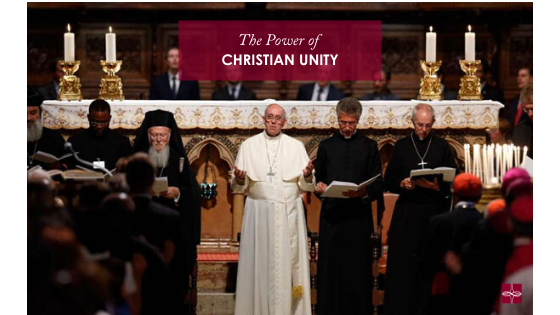
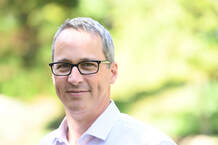
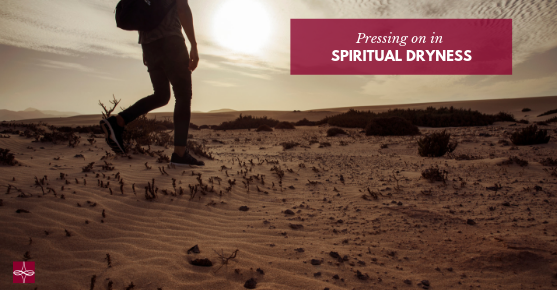

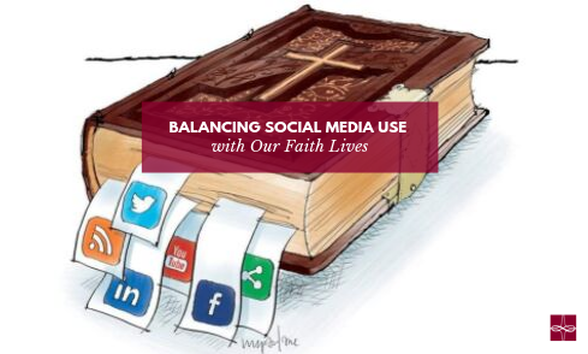

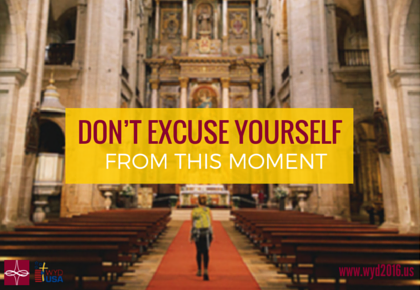

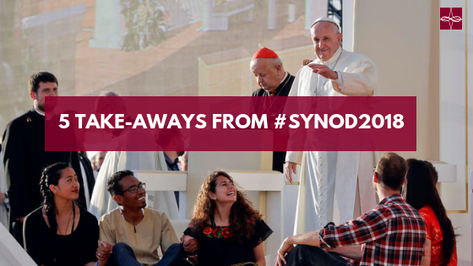

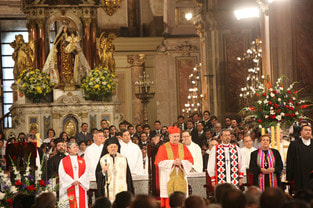
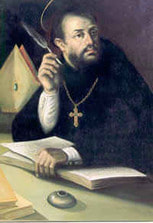

 RSS Feed
RSS Feed